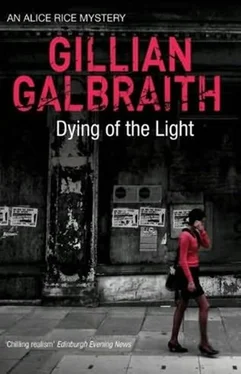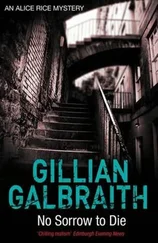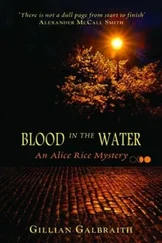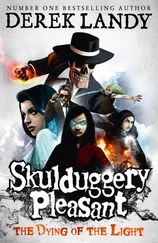‘You needn’t hae any worries, boss,’ Norman said, grinning and tipping his mug to drain it of its dregs, ‘they’re nae allowed tae dae awa’ wi’ themselves anyway. It’s against their law.’
‘Their religion,’ Sean corrected.
‘Aye,’ Norman agreed, ‘their religious law, ken.’
‘Naw,’ Jim Rose said bombastically, ‘that’s the Catholics. Papes cannae top themselves. Everybody else can!’
‘Christ!’ Norman shouted, ‘he’s a priest, man. A Catholic priest. What’s your intelligence quotient, boss?’
‘Ma whit?’ Jim asked, laughing uproariously.

In his cell the priest was lying spreadeagled on the cement floor. He had used one of his knee-length socks as a ligature but he had miscalculated, losing consciousness before complete asphyxiation occurred, releasing his grip as he passed out.
When Norman peeked through the spy-hole he thought, at first, that an escape had succeeded, as the cell appeared completely empty. Hurriedly, and gabbling excitedly to himself, he fumbled with the key in the lock, twisting it first one way in his panic and then the other until it turned, and he was able to open the door, finding it unaccountably heavy. As the body slid over the glistening floor, he put his shoulder against the metal, forcing the door further open to reveal the prostrate figure within. The dark-red, plethoric colour of the man’s face, fluid dripping from the nostrils, frightened the warder and he knelt close to the head, hearing a strange rasping sound coming from the mouth. But the bastard was alive, thank the Lord, their jobs would be safe.

Malcolm Starkie lived in a soot-blackened, Georgian terraced house in Sandford Gardens, a couple of minutes’ walk from his dental surgery. In his sitting-room he sat bolt upright in his armchair, unsmiling, displeased that the police sergeant had tracked him down to his home, not restricted herself and her enquiries to his professional premises in Rosefield Place. On the arm of the chair rested a piece of unfinished embroidery, a needle dangling loosely from it, suspended by a thread of red wool. On top of the dusty cloth, also dust-speckled, lay a pair of gold-rimmed, ladies’ spectacles.
‘I would prefer, Sergeant, that from now on you restricted your visits to my workplace.’
‘They told me you were here, sir. I just need to follow up one thing.’ Alice hesitated, oppressed by the gloomy atmosphere in the room and the forbidding expression on the dentist’s face. ‘Can you tell me where you were on Friday night, the twentieth, from, say, seven p.m. onwards?’
‘This Friday?’
She nodded.
‘Yes. I was at the photographic club in Durham Terrace.’
‘On your own, or with others?’
‘It was, eh… a special night. Most of the members were there, they could… corroborate, if that’s the right word, what I’m telling you, if necessary.’
She had no doubt that he was speaking the truth, Bill Keane had mentioned the club in passing in his statement, specifically referring to the number of professionals among the membership.
‘By the way,’ the dentist added, intruding into her thoughts, ‘I think that I can prove that I wasn’t anywhere near the prostitutes or their stamping grounds on the ninth.’
‘Good,’ she said encouragingly.
‘I’d forgotten when I last saw you, in the surgery I mean. Tanya, my receptionist, insisted I go bowling with her. She told me,’ he looked sheepishly at Alice, ‘that I’ve to be “taken in hand, taken out of myself”. So, every so often, she makes me… well, takes me out, you could say. We’ve been to a film once, went to the ice rink in Princes Street Gardens too.’
Trying to imagine the stick-thin, pale creature behind the reception desk having the strength to lift, never mind bowl, a bowling ball without being pulled, helplessly, towards the skittles herself, or pirouetting on ice in skates, risking her bird-like bones in the cold, Alice marvelled at her kindness. Books should not be judged by their covers.
‘Fine. I’ll nip round to the surgery right now and speak to her,’ she said, rising, eager to leave.
The man looked surprised and then burst into laughter.
‘Not my current receptionist – Christ Almighty! My last one, Tanya. Norma’s not interested in sport… or men, for that matter.’
As she was leaving the house Alice caught a glimpse, through an open door, of the man’s bedroom. A tangled mess of clothes covered the floor and the curtains were closed. But within the chaos there was an island of order; a wooden chair on which a set of women’s clothes were laid out, including tights, a skirt and a cherry-red cardigan. Like a shrine.

When Alice broke the news to Father McPhail’s named next-of-kin of his hospitalisation, following his failed suicide attempt, Mrs Donnelly covered her mouth in shock and let out a heart-stopping wail, understanding more fully than most the depths of the man’s despair. Unexpectedly, she then grabbed both of Alice’s hands, clasping them tightly in her own.
‘You believe, Sergeant, that he didn’t do it, don’t you?’ she said earnestly.
Alice hesitated for a second or so before answering. As it happened, she did not feel that he was the killer, but the damning forensic evidence against him had never been satisfactorily explained away, and a hunch seemed too little to go on.
‘What I think doesn’t really matter, it’s what the Detective Chief -’ she began, non-committally.
‘Stop right there!’ Mrs Donnelly said, interrupting her angrily, still clutching Alice’s hands and drumming them on the table as she spoke. ‘Of course it matters. If you think he’s guilty, you won’t continue looking for those women’s murderer, will you? And Father will try again, maybe succeed the next time. He must have lost all hope…’
The truthful answer would be short and simple. No. We won’t. But it sounded so final, likely to make the woman’s unhappy existence unhappier still, and so Alice found herself replying, ‘Actually, I do still harbour some doubts…’
I knew it – I knew it!’ the woman repeated, exultantly. ‘You’ve seen what Father’s really like. I’ve known him, been with him, for over two years, and there’s not a vicious bone in his body.’
Alice nodded, disconcerted by the situation and unimpressed by the length of time on which the housekeeper’s testimonial was based. If she’d known him over twenty years, maybe. Also, by admitting her doubt she might be, unintentionally, nurturing Mrs Donnelly’s false hopes, raising them higher yet before they were finally dashed. In all probability, they would be dashed.
‘I will keep trying,’ she said out loud, although speaking more for herself than the housekeeper. Mrs Donnelly smiled, finally releasing the policewoman’s captive hands, clearly embarrassed by her own reaction.
‘I don’t suppose,’ Alice said, the longest of long shots, ‘that Father was a bone-marrow donor – a kidney donor – anything like that?’
‘No. He is a blood donor, though, we both are.’
Gusts of wind gave the arctic air a razor’s edge, cutting Alice’s face as she fought her way up Broughton Street and making her eyes sting. Every few hundred yards she turned her back against the blasts, finding a temporary respite from their force before, with a sensation of dread, turning to brave their full fury once more. Throughout her slow ascent she fumed inwardly, thinking about Mrs Donnelly and the burden the woman had somehow managed to put on her shoulders, all hopes and expectations now resting on her. If Father McPhail was to try and kill himself again, never mind succeed, she would feel responsible – unless she had, whatever the rest of the squad thought, turned every remaining stone.
Читать дальше














